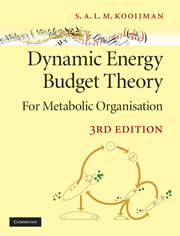Book contents
- Frontmatter
- Contents
- Preface
- 1 Basic concepts
- 2 Standard DEB model in time, length and energy
- 3 Energy, compounds and metabolism
- 4 Univariate DEB models
- 5 Multivariate DEB models
- 6 Effects of compounds on budgets
- 7 Extensions of DEB models
- 8 Covariation of parameter values
- 9 Living together
- 10 Evolution
- 11 Evaluation
- References
- Glossary
- Notation and symbols
- Taxonomic index
- Index
3 - Energy, compounds and metabolism
Published online by Cambridge University Press: 05 June 2012
- Frontmatter
- Contents
- Preface
- 1 Basic concepts
- 2 Standard DEB model in time, length and energy
- 3 Energy, compounds and metabolism
- 4 Univariate DEB models
- 5 Multivariate DEB models
- 6 Effects of compounds on budgets
- 7 Extensions of DEB models
- 8 Covariation of parameter values
- 9 Living together
- 10 Evolution
- 11 Evaluation
- References
- Glossary
- Notation and symbols
- Taxonomic index
- Index
Summary
Metabolism is about the transformation of compounds by organisms; some aspects of this process can only be understood by considering the abundance of the various compounds, and dealing with the links with energy and entropy. This chapter discusses the basic concepts for these links and considers a framework for the quantification of metabolic rates. Like the first chapter, this is a concepts-chapter to prepare for the further development of deb theory.
Energy and entropy
Energy fluxes through living systems are difficult to measure and even more difficult to interpret. Let me briefly mention some of the problems.
Although it is possible to measure the enthalpy of food through complete combustion, we need the free energy to quantify the amount of (metabolic) work that can be done with it. Food has a dual role in providing the capacity to do work as well as elementary compounds for anabolism. Another problem is that of digestive efficiency. The difference between the energy contents of food and faeces is just an upper boundary for the uptake by the animal, because there are energy losses in the digestion process. Part of this difference is never used by the organism, but by the gut flora instead. Another part is lost through enhanced respiration coupled to digestion, especially of proteins, called the heat increment of feeding, which is discussed on {151}.
Growth involves energy investment, which is partially preserved in the new biomass. In addition to the energy content of the newly formed biomass, energy is invested to give it its structure.
- Type
- Chapter
- Information
- Dynamic Energy Budget Theory for Metabolic Organisation , pp. 79 - 113Publisher: Cambridge University PressPrint publication year: 2009



